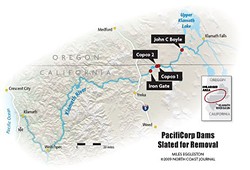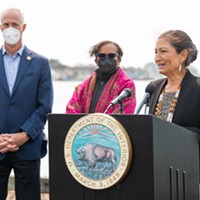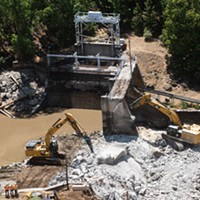Wednesday, September 16, 2015
Yurok Tribe no Longer Supports Klamath River Agreement
Posted By Grant Scott-Goforth @GScottGoforth on Wed, Sep 16, 2015 at 11:19 AM
NOTE: This post was updated with comment from Huffman.
The Yurok Tribe has announced it will withdraw its support of the Klamath Basin Restoration Agreement, the massive, multi-agency restoration plan originally signed in 2010 that’s sat untouched by Congress for the last five years.
The Karuk Tribe and Oregon Klamath Tribes will also withdraw at the end of the year if Congress doesn’t act, according to a Times-Standard report. The Yurok Tribe is citing a provision in the agreement that it says allows the tribe to withdraw its support.
In a press release, the Yurok Tribe says the agreement has changed over time, and that negotiations about the Upper Klamath Basin have proceeded without tribal input, despite promises to include Yurok negotiators.
The KBRA, whichincludes a is linked to plans for removing four dams on the Klamath River, was remarkable in the scope of interested parties that signed onto the agreement. Many parties, as evidenced by the Yurok Tribe’s announcement, were not completely happy with the specifics of the agreement, but there was hope in the early days that the consensus would be enough to get Congress to take action. That has not happened.
North Coast Congressman Jared Huffman released a statement saying he was disappointed with the tribe's decision, but shared its frustration with the lack of action in Congress.
From the Yurok Tribe:
The Yurok Tribe has announced it will withdraw its support of the Klamath Basin Restoration Agreement, the massive, multi-agency restoration plan originally signed in 2010 that’s sat untouched by Congress for the last five years.
The Karuk Tribe and Oregon Klamath Tribes will also withdraw at the end of the year if Congress doesn’t act, according to a Times-Standard report. The Yurok Tribe is citing a provision in the agreement that it says allows the tribe to withdraw its support.
In a press release, the Yurok Tribe says the agreement has changed over time, and that negotiations about the Upper Klamath Basin have proceeded without tribal input, despite promises to include Yurok negotiators.
The KBRA, which
North Coast Congressman Jared Huffman released a statement saying he was disappointed with the tribe's decision, but shared its frustration with the lack of action in Congress.
From the Yurok Tribe:
From Huffman's Office:
Over the past decade, the Yurok Tribe has worked diligently to bring together diverse irrigation, environmental, tribal, power industry, federal, and state parties to develop a workable solution for the Klamath River that would remove the Klamath River dams, restore the fishery, and protect tribal water rights. These efforts, along with the efforts of others, resulted in the historic Klamath Basin Restoration Agreement (KBRA) and related Klamath Hydroelectric Settlement Agreement (KHSA), collectively called the Klamath Agreements.
The KBRA, which was signed in February 2010 and amended in 2012, was carefully negotiated to provide fish and tribal water rights protections for the entire river system while also accounting for irrigation, power, and other interests. The KHSA complemented these benefits by orchestrating dam removal in a timely manner. Unfortunately, Congress has failed to pass legislation authorizing the agreements, and over time the bargained for benefits of the agreements have become unachievable.
The Tribe is left with no choice other than to withdraw from the Klamath Agreements. The Klamath Agreements were reached by thoughtful negotiation that resulted in a delicate balance of bargained for benefits for each party. The Yurok Tribe played a leadership role and invested extensive financial, technical, and human resources in the process. The bargained for benefits of the Klamath Agreements, however, have drastically changed since their passage in 2010. The Tribe has been working diligently over the past year and a half to try to restore this balance.
In 2013, the U.S. Department of Interior (DOI), State of Oregon, Klamath Tribes and others began negotiating an agreement to address water rights claims in the Upper Klamath Basin. This water agreement, involving private water users not on the U.S. Bureau of Reclamation Klamath Project, was contemplated by the KBRA. The Upper Klamath Basin parties during negotiations of the KBRA had assured the Yurok Tribe that they would address how the Tribe would be involved in governance and technical forums in the Upper Klamath Basin. The Tribe reminded various parties of this and requested to be involved in the Upper Klamath Basin negotiations. The Tribe was not invited to participate in the negotiation of this agreement. This represented a return to the old OregonCalifornia/Upper Klamath-Lower Klamath division of the Klamath River system rather than the comprehensive approach taken by the Klamath Agreements.
The Upper Klamath Basin Comprehensive Agreement was finalized in March 2014 without the participation of the Yurok Tribe. It provides additional benefits to member parties that upset the bargained for benefits of the KBRA and KHSA. The Tribe was prepared to withdraw from the KBRA in April 2014. The Tribe and DOI, however, began negotiations to try to restore the bargained for benefits of the Klamath Agreements to the Tribe. The Tribe and DOI reached principles of agreement in November 2014 and the Tribe remained a party to the Klamath Agreements pending a final signed agreement. In January 2015, the Tribe filed a Dispute Initiation Notice pursuant to the KBRA section 6.5, specifying that a signed agreement between DOI and the Tribe was critical to restoring the bargained for benefits of the KBRA.
Despite numerous discussions, informal and formal meetings, and the best efforts of the disputing parties, DOI and the Tribe were not able to develop mutually acceptable language. It has become apparent that a signed agreement restoring the KBRA balance is no longer possible. As a result, the Yurok Tribe is withdrawing from the Klamath Agreements.
The Tribe and DOI have invested countless hours discussing issues, exploring ways to restore the bargained for benefits in the KBRA, and attempting to develop mutually acceptable language for an agreement. Despite these diligent efforts and numerous concessions by the Tribe, the dispute was not resolved. In the absence of resolution, the Tribe is referring the dispute to the Klamath Basin Coordinating Council pursuant to KBRA section 6.5.3. The Tribe requests the Klamath Basin Coordinating Council expedite any attempt to resolve the dispute.
Congressman Jared Huffman (D-San Rafael) today released the following statement after the Yurok Tribe announced it will be withdrawing from the Klamath Basin Restoration Agreement (KBRA) and related Klamath Hydroelectric Settlement Agreement (KHSA), collectively known as the Klamath Agreements:Editor's note: This post was changed to clarify the KBRA's connection to dam removal plans.
“While I am disappointed by the Yurok Tribe’s change of heart on the Klamath agreements, I share their frustration with the lack of action in Congress over the past three years. This historic consensus effort to remove Klamath River dams and restore one of the most important salmon rivers on the West Coast is premised on congressional authorization, and as years tick by with little action by Congress the obvious risk is that the stakeholder consensus starts to unravel.
“I remain convinced that the Klamath agreements are the best way forward and that a return to squabbling over water and the future of the dams on the river is a step backward. But my patience, not unlike the Yurok Tribe’s, is wearing thin due to delays and inequities in addressing the concerns of stakeholders in my district, where the Klamath River is the lifeblood for many of my constituents.
“The Yurok announcement demonstrates that time is not on our side.
“As Congress has failed to act, we have narrowly avoided massive fish kills in the Klamath each of the past three years. For the tribes, communities and fisheries of my district, restoring the Klamath River is too important to wait endlessly. It’s time for Congress to get moving on forward-thinking Klamath legislation that removes the dams and restores the river and its fisheries for the benefit of stakeholders in both California and Oregon.”
Speaking of...
Comments (2)
Showing 1-2 of 2
Readers also liked…
more from the author
-
Flamin' Hot's Stale Corporate Propaganda
- Jun 15, 2023
-
Hell is Visiting Other People
- Sep 22, 2022
-
The Bear Roars
- Aug 18, 2022
- More »




































